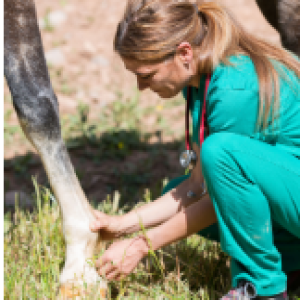Episodes

Friday Mar 20, 2020
Friday Mar 20, 2020
Alice Bird, Senior Clinician in Anaesthesia at the Animal Health Trust, talks through the significant event audit of a postoperative complication that occurred in equine practice, including how a blame culture was avoided, lessons learned and resultant processes put in place.
The session formed part of the RCVS Knowledge Equine Roadshow recorded at Ashbrook Equine Hospital in 2019, sponsored by the Horserace Betting Levy Board and accredited by the British Equine Veterinary Association.
Download the accompanying presentation and full transcript from the RCVS Knowledge website.
CPD: 40 mins

Friday Feb 28, 2020
Friday Feb 28, 2020
Checklists have been used in aviation and human medicine for decades, given their proven power to reduce avoidable errors and significant events.
Amanda Boag (Clinical Director at Vets Now, RCVS Knowledge Trustee and Vice-President of the Royal College of Veterinary Surgeons) discusses the state of play with checklists in the veterinary industry, why checklists are liberating rather than constraining, and how a simple piece of paper can save lives.
Download the full transcript, the accompanying presentation and RCVS Knowledge's new Surgical Safety Checklist Manual from the RCVS Knowledge website.
This podcast is part of the Knowledge Sessions, a resource that brings together specialists from across the veterinary industry to examine the landscape, propose potential approaches to complex problems, and provide practical advice on a range of subjects.

Wednesday Feb 26, 2020
Wednesday Feb 26, 2020
In this Audio Summary, Jacqueline looks at the evidence around whether a daily probiotic supplement improves clinical outcomes in dogs with diarrhoea. Read the full Knowledge Summary here.
Audio Summaries are a free resource that enables vets and vet nurses to access and digest relevant and up-to-date evidence quicker and easier! A time-saving way to make better and faster evidence-based decisions.
Access the transcript here.

Thursday Jan 30, 2020
Thursday Jan 30, 2020
Doing research as a veterinary practitioner is easier and more rewarding than you think. But what kind of research can you do? What are the benefits of doing research in practice, and what skills and resources do you need? Where do you get started, and what kind of impact can you make?
Dr Marnie Brennan, Dr Zoe Belshaw and Hannah Doit from the University of Nottingham’s Centre for Evidence-Based Veterinary Medicine provide an approachable step-by-step guide, with tips on making research in practice useful and fulfilling, and some inspiring examples.
Download the full transcript and the references from the RCVS Knowledge website.
This podcast is part of the Knowledge Sessions, a resource that brings together specialists from across the veterinary industry to examine the landscape, propose potential approaches to complex problems, and provide practical advice on a range of subjects.

Wednesday Jan 22, 2020
Wednesday Jan 22, 2020
In this Audio Summary, Vitória looks at the evidence around whether sheep vaccinated against caseous lymphadenitis (CLA) are less likely to develop the disease when compared to unvaccinated sheep. Read the full Knowledge Summary here.
Audio Summaries are a free resource that enables vets and vet nurses to access and digest relevant and up-to-date evidence quicker and easier! A time-saving way to make better and faster evidence-based decisions.
Access the transcript here.

Tuesday Dec 17, 2019
Tuesday Dec 17, 2019
This roundtable discussion looks at the controversial area of patient values and ethics in evidence-based veterinary medicine. What are patient values and do they matter? How does animal sentience affect the notion of informed consent? Who should have the final say in potential treatment?
Peter Cockcroft, Editor-in-chief of Veterinary Evidence, chairs this fascinating and wide-ranging podcast recorded last year featuring experts in the field: Carol Gray, David Mills, Siobhan Mullan, Francoise Wemelsfelder and James Yeates.
Download the full transcript.
This podcast is part of the Knowledge Sessions, a resource that brings together specialists from across the veterinary industry to examine the landscape, propose potential approaches to complex problems, and provide practical advice on a range of subjects.

Monday Dec 16, 2019
Monday Dec 16, 2019
In this Audio Summary, Honoria looks at the evidence around whether changes in hoof wall temperature and digital pulse pressure can be used to predict laminitis onset. Read the full Knowledge Summary here.
Audio Summaries are a free resource that enables vets and vet nurses to access and digest relevant and up-to-date evidence quicker and easier! A time-saving way to make better and faster evidence-based decisions.
Access the transcript.

Friday Nov 22, 2019
Friday Nov 22, 2019
For World Antibiotic Awareness Week, UK Chief Vet Christine Middlemiss chairs a roundtable discussion on challenges presented by antimicrobial resistance and ways to tackle it, with guests Ian Battersby (Davies Veterinary Specialists/Mission Rabies), Steve Howard (PDSA), Kristen Reyher (Bristol Veterinary School) and David Singleton (Small Animal Veterinary Surveillance Network).
This podcast is the first of 'The Knowledge Sessions', a series of discussions with leading experts on hot topics in evidence-based veterinary medicine.
Download the full transcript from the RCVS Knowledge website.

Monday Nov 18, 2019
Monday Nov 18, 2019
In this Audio Summary, Avril looks at the evidence around whether oral B12 tablets can be used to treat hypocobalaminaemia in dogs with chronic enteropathies. Read the full Knowledge Summary here.
Audio Summaries are a free resource that enables vets and vet nurses to access and digest relevant and up-to-date evidence quicker and easier! A time-saving way to make better and faster evidence-based decisions.
Access the transcript

Wednesday Oct 23, 2019
Wednesday Oct 23, 2019
In this Audio Summary, Louise looks at the evidence around whether Pet Remedy reduces stress in dogs. Read the full Knowledge Summary here.
Audio Summaries are a free resource that enables vets and vet nurses to access and digest relevant and up-to-date evidence quicker and easier! A time-saving way to make better and faster evidence-based decisions.
Access the transcript.



